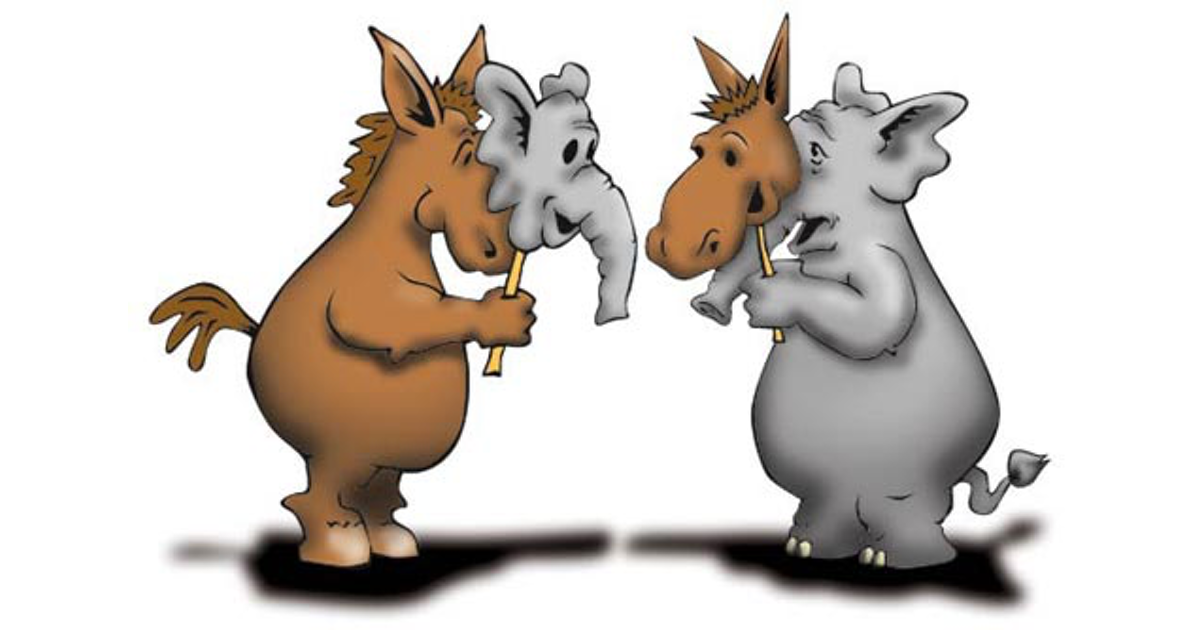|
Ron Paul delivered the keynote speech at this year's Ron Paul Institute Media & War Conference in Washington, DC last month. Be sure to visit RPI at http://www.ronpaulinstitute.org
After three years of US-supported Saudi and United Arab Emirates war on Yemen - with thousands of civilians dead and millions facing starvation - some Members of Congress are looking to curb US facilitation of the genocide. Will new measures taken in Congress result in an end to the US participation?
President Trump's speech to the UN General Assembly yesterday drew some unexpected laughter and a good deal of head-scratching. Is the US really respecting sovereignty worldwide? Former CIA officer Phil Giraldi joins today's Liberty Report to break it down.
Dr. Paul returns to the hot seat to answer viewer questions on topics of the day. Who was the worst president? Watch today's Liberty Report!
By Ron Paul
This week the House of Representatives will vote on a package of bills making the temporary tax cuts contained in last year’s tax reform bill permanent and making additional tax law changes. The bills will likely pass in the House, but will almost certainly be filibustered in the Senate if the Senate leadership tries to bring them to the floor. The GOP tax plan does offset some of the damage caused by federal control of education by making it easier for parents to escape failing government schools or “edexit.” It accomplishes this by allowing money saved in a tax-free 529 education savings account to be used for homeschooling expenses. This provision will help homeschooling families and inspire more families to consider homeschooling. Homeschooling parents must not only pay for all their children’s education expenses, they also must subsidize government schools via property taxes and other taxes. A commitment to homeschooling may also require a parent to limit or even forgo outside employment. Despite the financial costs, more families are choosing to homeschool. This is due to increasing dissatisfaction with government schools, greater public acceptance of homeschooling, and the availability of quality online homeschooling curricula, such as my Ron Paul Curriculum. My curriculum provides students with a well-rounded education including rigorous programs in history, mathematics, and the physical and natural sciences. The curriculum also provides instruction in personal finance. Students can develop superior oral and verbal communication skills via intensive writing and public speaking courses. Students also get the opportunity to create and run their own internet businesses. The government and history sections emphasize Austrian economics, libertarian political theory, and the history of liberty. However, unlike government schools, my curriculum never puts ideological indoctrination ahead of education. Unlike government schools, and even many private schools, my curriculum addresses the crucial role religion played in the development of Western civilization. However, the materials are drafted in such a way that parents of any or no religious belief can feel comfortable using the curriculum. Interactive forums allow students to engage with and learn from each other. The forums ensure students are actively engaged in their education as well as give them an opportunity to interact with their peers outside of a formal setting. The latest Republican tax plan has laudable features, such as allowing the use of tax-free education savings accounts for homeschooling. However, as long as Congress refuses to offset tax cuts with spending cuts, the benefits of tax cuts will be limited and short-lived. Therefore, while all lovers of liberty should support any and all tax cuts, we must work to pressure Congress to cut spending. Bringing the troops home and shutting down the Department of Education are two good places to start. Parents interested in my homeschooling curriculum can find out more about it at ronpaulcurriculum.com.
China's "social credit" system purports to rank citizens according to their behavior, trustworthiness, and adherence to the law. Political dissent results in a lower "social credit" score and a reduction in privileges. The system is enforced by hundreds of millions of cameras throughout the country using facial recognition software. It's thoroughly dystopian...but is a similar system to crush dissent being built here in the US under our noses?
By Tho Bishop
The socialist policies of the Venezuela government continue to impose a living hell on its people. Hyperinflation has turned its currency toliteral garbage. Mortality rates have skyrocketed for groups such as infants, pregnant mothers, and the elderly as clinics have shut down and medicine grown scarce. Food has disappeared from store shelves forcing the population to consume pets and zoo animals. A recent poll found that 78% of Venezuelans “reported trouble keeping themselves fed.” Of course, this is not true for all Venezuelans. Earlier this week President Nicolas Maduro was seen in a plush Istanbul restaurant lavishly dining on expensive steaks while smoking fine cigars, the check paid for by the wealth his regime has drained from his people. Once again we see that under socialism “all animals are equal, but some animals are more equal than others.” While the outrage over Maduro’s obtuse opulence is well deserved, it serves as only a gaudy reminder of how socialism actually operates in the real world. The more controlled an economy becomes, the more it benefits those with power. While less obvious than Maduro’s dinner prepared by celebrity chefs, we’ve seen this play out throughout the country. The regime understands that its survival depends upon keeping the guns of government pointed at the people, and not at themselves. As such, the country has fallen into rule by corruption, with the police and military being offered access to food and supplies in exchange for their loyalty. Maduro’s government is able to benefit from the trade in a variety of ways. As a South American businessman told an AP reporter last year, a bribe to the right official allows him to sell his goods to the Venezuelan government. He can afford to pay it because the government pays him a higher price than international markets do. The government then takes the food and gives it to the military, who is then able to feed their families and sell the rest — and for dollars as opposed to increasingly worthless bolivars. It’s been noted that in Venezuela today, black markets in food are “a better business than drugs.” As is the case with any other black market, the business is even better if it comes with the protection of a government badge. Not only is Maduro’s regime active in supplying the black markets of government officers, but they also unleash the police on the bachaqueros — illegal vendors — that compete with them. This is not the only way that those with state privilege are able to profit from the horrors of socialism. As the Miami Herald reported recently, those close to Maduro — including his stepsons — have been able to exploit the government’s currency exchanges at rates that don’t take into consideration the hyperinflation going on within the country. It has resulted in $1.2 billion money-laundering case filed in Miami: In the Miami federal case, prosecutors charge that a network of Venezuelan businessmen and executives with the national oil company PDVSA managed to quickly turn $42 million worth of bolivars into $600 million in U.S. dollars by simply making a “loan” to the state-owned firm. PDVSA tapped into the government exchange to pay off the loan in a few months and, according to federal court records, funneled the windfall back to the ring. Its members then hid the money in Europe and the U.S. and bought up mansions from Cocoplum to Wellington in South Florida.
This corruption, of course, is not unique to Maduro's regime — but simply a byproduct of the socialist system he inherited. Hugo Chavez may still remain popular among many within the country, but his own corruption has enabled his daughter to enjoy a life of luxury. Her wealth has been estimated in the billions, so she can even afford more houses than Bernie Sanders and nicer outfits than Alexandria Ocasio-Cortez.
Socialism is sold to the idealistic and naïve as a way to end the inequality that exists in a free market. In reality, it only changes the way in which power and privilege is consolidated. On the market, wealth is acquired through voluntary exchange and serving the desires of consumers — one of the manyways it makes us more humane. In socialism it’s acquired through force and brutality. As F.A. Hayek explained in The Road to Serfdom, the result is the worst rising to the top. For the people in Venezuela, their future will not be improved by simply replacing Maduro for a more modest socialist leader. It can only come by rejecting the very ideology that has eroded away the country’s wealth for decades. Until then, those with political power will continue to live at the expense of their neighbors.
This article was originally published at The Mises Institute.
By Liberty Report Staff
The great Austrian economist, Ludwig von Mises, had a cameo in the Black Swan Man comic series:
By Ron Paul
According to a recent Reuters/Ipsos survey, 70 percent of Americans, including about 50 percent of Republicans, support Medicare for all, the latest incarnation of single-payer health care. Republican support for a health plan labeled “Medicare for all” is not surprising considering that Republican politicians support Medicare and that one of their attacks on Obamacare was that it would harm the program. Furthermore, the biggest expansion of Medicare since its creation — the Part D prescription drug program — occurred under a conservative president working with a conservative Congress. Conservative Republicans do propose reforming Medicare to reduce its costs, but their proposals are always framed as “saving Medicare,” and most reform plans increase spending. Few conservative Republicans would dare advocate allowing young people to opt out of paying Medicare taxes in exchange for agreeing to forgo Medicare benefits. Many conservative Republicans favor other government interventions into health care, including many features of Obamacare. In fact, Obamacare’s individual mandate originated as a conservative proposal and was once championed by many leading Republicans. Many other Republicans simply lack the courage to repeal Obamacare, so they say they only want to repeal the “unpopular” parts of the law. It would not be surprising if we soon heard conservatives and Republican politicians talk about defending Obamacare from supporters of socialized medicine. The same dynamic at work in health care is at work in other areas. For example, the same conservative administration and Congress that created Medicare Part D also dramatically expanded federal control of education with “No Child Left Behind.” Conservative Republicans who (rightly) fight against deficit spending when a Democrat sits in the White House decide that “deficits don’t matter” when the president has an “R” next to his name. Many Republican politicians — and even conservative intellectuals — will say they are being pragmatic by not fighting progressives on first principles, but instead limiting the damage done by the welfare state. The problem with this line is that, by accepting the premise that government can and should solve all of life’s problems, conservatives and Republicans will inevitably get into a “bidding war” with progressives and Democrats. The only way Republicans can then win is to join Democrats in continually increasing spending and creating new programs. This is why the so-called “conservative welfare state” ends up as bloated and expansive as the progressive welfare state. Refusing to question the premises of the welfarists and socialists is not a pragmatic way to advance liberty. While progressives blame social crises on the free market, Republicans and conservatives are unwilling to admit the problems were caused by prior government interventions. Thus the passage of Dodd-Frank was aided by claims that the housing bubble was created by deregulation, while Obamacare’s passage benefited from widespread misconception that America had a free-market health care system prior to 2010. Until a popular intellectual movement arises that is able and willing to challenge the premises of Keynesianism, welfarism, and democratic socialism, while putting forth a positive vision of a free society, government will continue to expand. Fortunately, such a movement exists and is growing as more Americans — particularly young Americans— are studying the ideas of Liberty and working to spread those ideas. If the new liberty movement grows and stays true to its principles, it will be able to defeat the socialists of all parties, including those who call themselves conservative.
As a presidential candidate, Donald Trump correctly called the economy a "big, fat, ugly bubble." The bubble is now much bigger, but President Trump has stamped his name on it. Interest rates are now rising. Is the end of the everything bubble near?
|
Archives
July 2024
|





 RSS Feed
RSS Feed



